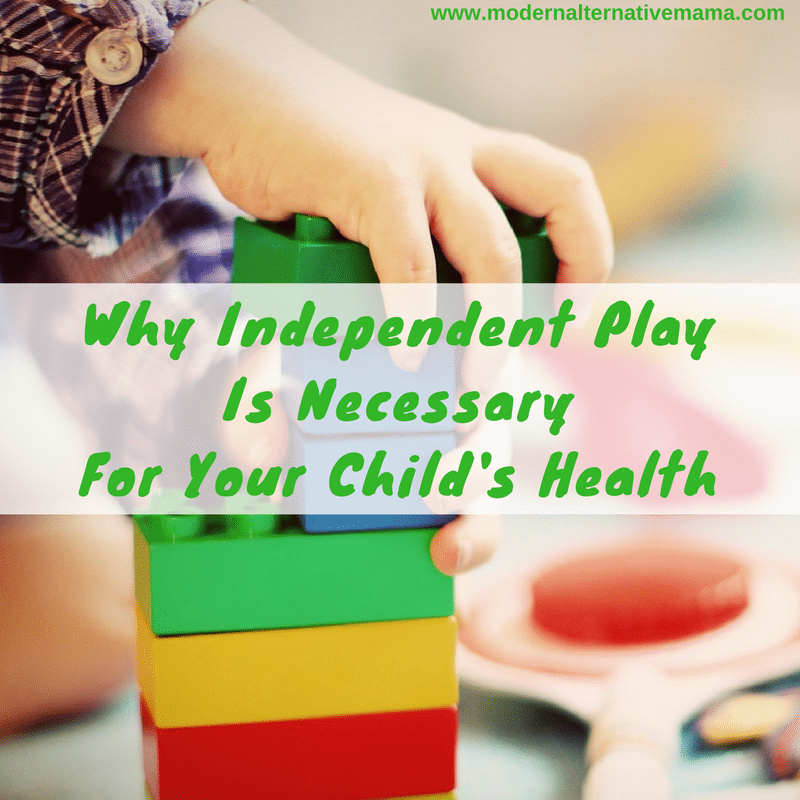How often do your children play quietly by themselves? So many children today are over-worked and over-stimulated. They are attached to their electronic devices and play with toys that don’t leave much to the imagination. On top of that, we are concerned about our children’s safety and don’t let them run around the neighborhood with friends like children did a generation ago. When a child grows up with us watching over them and dictating their every mood, how can they possibly have time to develop creativity and independence?
Contributing writer, Sandi Schwartz, shows, in this post, how our children need to spend some time alone playing, pondering, and unwinding. Independent play—when children occupy themselves with toys, games, or self-guided activities—is an essential skill for them to grow up healthy and happy.
Why Independent Play Is Necessary For Your Child’s Health
When children play freely and independently, they gain so many skills that are critical to their healthy development—psychological, emotional, and physical. Children who use their imagination to make up their own games, characters, and stories without guidance from a parent, teacher, or other adult learn to recognize and express their emotions, be independent and confident, solve problems, and cope with new situations. They also learn to regulate their fear and anger in challenging situations. Overall, play is vital to a child’s education, success, and happiness.
Here are some of the skills children acquire from playing independently:
Self-Confidence
Children who play by themselves learn to have fun on their own without relying on others for their happiness and entertainment. This is such an important life-long skill because as children grow, they will be in situations when they are alone and will need to be able to care for themselves. This independent time will help them feel more confident and satisfied.
Executive Function
Studies show that when children play independent games like make-believe, they develop a critical cognitive skill called executive function. This ability helps children self-regulate, which means they can control their emotions and behavior, resist impulses, and exhibit self-control and discipline. These are all critical attributes for living a healthy, safe, successful life.
Creative Problem-Solving Skills
Time alone stimulates children to use their imagination. Without adults or playmates around to dictate their actions, children have the freedom and flexibility to explore their own creative ideas. This experience leads to better problem-solving skills down the road. People who are able to solve problems effectively tend to be more successful in school, at work, and in life overall.
Patience
It is important for children to learn that their parents will not always be at their “beck and call”. Knowing how to play independently helps build patience, giving them a skill that will be needed throughout life.
Calmness
When children learn how to successfully play by themselves—and enjoy it—they tend to find this alone time quite calming. Their mood shifts because they no longer need to put energy into arguing or competing with others.
With all the electronics and hectic schedules, it is challenging for children to have time to unwind. Independent play gives them a special opportunity to shut off all the distractions and focus mindfully on what they are doing. Finally, independent play teaches children how to look inward and self-soothe. Once they master this skill, they can begin to understand their own emotions and communicate those feelings.
How To Encourage Independent Play
How our children spend their time is well within our control. Here are some steps you can take to encourage your children to play more independently:
- Limit Competing Activities. When children are so busy with structured extracurricular activities like music lessons and sports teams, they have little time left for free independent play. Evaluate your children’s schedules and leave some time open during the week for them to explore on their own. Also, you will need to discourage some distracting activities and habits like watching television and playing video games.
- Provide the Right Tools. By giving your children certain supplies, you can spark their imagination. Some ideas include putting together a bin filled with arts and crafts, small instruments, old magazines, scraps of cloth, pots and pans, cardboard boxes of varying sizes, or your old clothing and accessories for dress up time. Try gathering some items from the kitchen that you were planning on recycling (e.g. egg cartons, soda bottles, plastic caps) and let them design something fun. You can also give them some basic, old-fashioned toys to play with like dominoes, cards, puppets, blocks, and puzzles. Finally, encourage them to spend time outdoors exploring on their own. They can set up an obstacle course or go on a backyard nature scavenger hunt.
- Ease Into It. Some children will have trouble separating from you and entertaining themselves. It may take time for them to learn how to enjoy playing without you. If this is the case, start slowly with only five minutes of independent play and then increase the time by a few minutes every week until it becomes part of your child’s normal routine.You can also begin by staying in the room, but focus on your own activity as your child starts to get involved with what he or she is doing. This way, you are not directly involved but are providing a comfort to your child. You can slowly disengage and leave the room as your child gets more comfortable being alone.
- Set Boundaries. When you first introduce the concept of independent play, it is important to explain what it means to your children. Make sure they know it is not a punishment; they didn’t do anything wrong. Feel free to tell them some of the amazing benefits of free play, such as how it will help them expand their creativity and problem-solving skills. Then explain approximately how long you expect them to be independent and where you will be if they need you. One idea is to set a timer or show them on a clock how long play time will last.What do you do about siblings who want to play with each other? Even if you have a house full of kids, it is still valuable for each of them to spend some time alone. Designate certain areas of the house for each child to have their alone time. You can switch off between one being in the playroom or family room and the other spending time in their bedroom.Finally, set some boundaries regarding what they are allowed to do while playing independently. Can they use scissors or glue? Are they allowed to go outside or into the garage to grab something?
- Praise Them. When independent play time is over, be sure to provide some positive feedback to your children for doing such a great job playing by themselves. Ask them what they did and to show you what they created. By rewarding them with a compliment, they will be encouraged to play independently again in the future.
Independent play offers so many wonderful benefits to our children as they grow. Just be careful that your children don’t spend too much time playing alone. They also need plenty of attention from you and to spend a good portion of their day socializing with their family and friends.








[…] Why Independent Play Is Necessary For Your Child’s Health […]
Thanks for your advice. Through this story I have more experience and care to help children play independently. I will come back to continue to watch these new posts on this site.
Thanks for sharing! Great!
I’ve enjoyed picking up some fresh ideas as well. Pinning for my own future reference.
[…] though the guilt will still rear its ugly head, I will remember that it’s good for kids to play by themselves, and I need some self-care in order to be the best Mother I can be for my […]